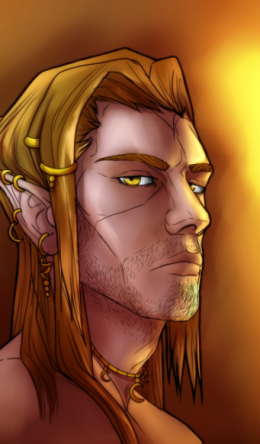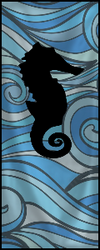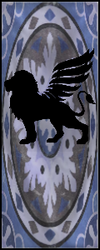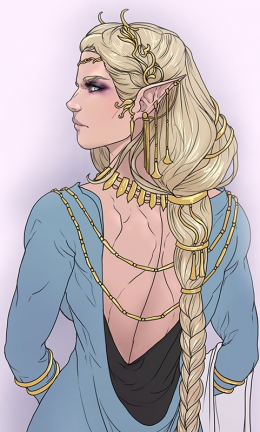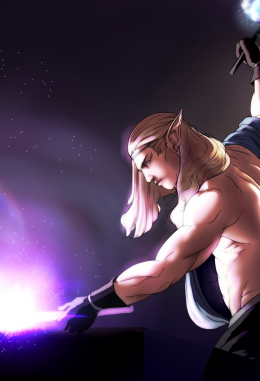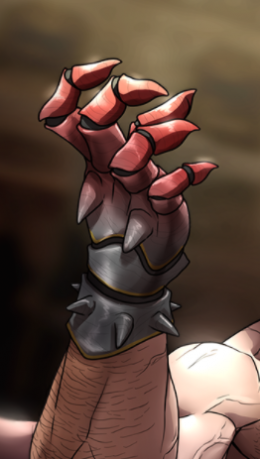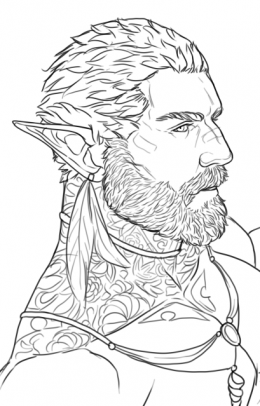Teledden: Difference between revisions
(Removed redirect to Altalar#Teledden) Tag: Removed redirect |
m (→Abilities) |
||
| Line 60: | Line 60: | ||
| Constant Passive | | Constant Passive | ||
| Self | | Self | ||
| Grants the user {{#simple-tooltip: Invasion Immune | The user is Immune to any type of Invasion or Control that would cause some other entity to invade their body or mind, and control it. This also applies to Ordial | | Grants the user {{#simple-tooltip: Invasion Immune | The user is Immune to any type of Invasion or Control that would cause some other entity to invade their body or mind, and control it. This also applies to Ordial, Void and Exist Spirits, but not Greater Spirits or Event Entities. Additionally, the user will also know that they were just invaded, but they cannot forcibly expel the invader if they do not want to leave. Finally, they can choose to let the invader take control, but can take control back anytime. This only counts for unwilling invasion. The user can still willingly make pacts with Spirits and invite them in. | ||
}} | }} | ||
| {{#simple-tooltip: Teledden Modifier | Teledden have such Invasion Immunity that they can imprison an invader in their body against their will, or expel them against their will. Inside a Teledden's body, an invader becomes a powerless passenger who can only act when the Teledden lets them.}} | | {{#simple-tooltip: Teledden Modifier | Teledden have such Invasion Immunity that they can imprison an invader in their body against their will, or expel them against their will. Inside a Teledden's body, an invader becomes a powerless passenger who can only act when the Teledden lets them.}} | ||
Revision as of 22:10, 4 December 2022
| Teledden | |
|---|---|
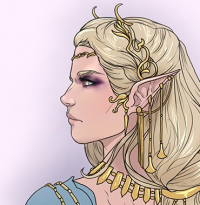 | |
| Race | |
| Pronunciation | Teled-enn |
| Classification | Magus |
| Common Nicknames |
|
| Languages | Altalar. |
| Racial Traits | |
| Distinctions | Careful, charismatic and wise high Elves. |
| Maximum Age | 500 |
| Height | Tall |
Core Identity
Introduction
The Teledden are the classical high Elves: skilled in magic and clever with their words, graceful and ancient. As the oldest Nelfin culture, they consider themselves the natural leaders of their people, and steep themselves in the history and politics necessary to do so. While many other Nelfin have specialized away from their Teledden roots, swearing oaths to Gods or being changed by powers from beyond the Veil, the Teledden are true to their original nature, the same in body and mind as those who walked the earth ten thousand years ago.
Crown of the World
Few peoples have a history as long as that of the Teledden. For millennia after they unified into the first Nelfin state, the Allorn Empire, they achieved a string of victories over their many opponents that defined their culture and that of all the Nelfin to come. Although their domain is not what it used to be, the Teledden truly believe that they are capable of recapturing the glory they have lost, and that they can and should take a leading role in world affairs - even if not all Teledden believe in the Allorn Empire itself. The Crown of the World, the legendary regalia of the Allorn Empresses, is a physical object: but also a metaphor for the Allorn Empire’s legacy, the legacy of the world that the Teledden built, and everyone else is just living in.
Magisterial
The Teledden are some of Aloria’s most capable magisters. This is not due to any inherent racial strength, but due to millennia spent refining and utilizing the craft when it was at the height of its power. After all, Magic was far stronger before Cataclysm, as any Teledden of sufficient age to remember those days would wistfully recall. While they have a strong bias towards Exist Magic due to their religion, the Teledden are not especially dogmatic about it, and see any and all kinds of Magic, even Primal Magic that wants to see other Magic erased, as a tool. Therefore it is only in the Teledden heartlands that records on all manner of Arcane lore are freely kept and studied, and no information in pursuit of enlarging the art is taboo.
Estellian
There is a focus in the Estellon religion on achieving perfection and being the best and most skillful person one can be. As those with the longest history of observing Estellon, the Teledden have this notion baked into their culture in a way few others do. It is encouraged that Teledden players read the Estellon page, as there are concepts there relevant to playing a Teledden that are not double-stated on this page. Most important to understand is that the Teledden concept of ruling the world, the history of the Allorn Empire, and the Estellon religion are all tied together: in fact, the eldest of the Estellon gods, Elleyon, is considered the patron saint of the Allorn Empire, while the hunter god Ghilland enabled Allorn slavery by preaching that their actions were a benevolent civilizing mission.
Origins
The Teledden first arose thirty thousand years ago, though their history does not truly begin until their first Empress, Talea, created their Allorn Empire in 10000 BC. Records from this period are unclear, but it is known that Talea unified the divided kingdoms of the Teledden both as General and prophet of the goddess Estel, a powerful Magical deity with a Pantheon of gods who are now synonymous with Teledden civilization. Destroying their rival civilization (the Asha Dewamenet Empire to the north) and reducing them to slavery, the Teledden would spend the next millennia leading their cousin-Races the Fin’ullen, Suvial, and Solvaan under the banner of the Allorn Empire. The reigns of legendary empresses are innumerable: the Teledden explored every continent there was to explore, met every people there was to meet, although the Fin’ullen did most of the sailing. But as the Empire grew old and swelled with new ideas, religions, and cultures, it destabilized. The ways of Talea’s days lost popularity as Cults arose under charismatic preachers and influential generals, each believing there was a different, better way for the Allorn Empire to move forward. And by 1000 BC, it was tearing itself apart. Magic was stronger in the days of the Teledden: their Mage-Wars saw casualties and destruction on a level unthinkable in the modern day, entire continents cracking and collapsing into the ocean.
By 100 BC, the Empress was little more than a figurehead, while powerful nobles ran the hopelessly decentralized country. The true death knell of the Empire was the Night of the Fallen Star, where those who had turned from Estel worship to the Void slaughtered the clergy and eliminated the final opposition to their rule. Other separatist groups, such as the Dragon-worshiping Isldar, self-evolving Maquixtl, and Demon-hating Sihndar, had long left and been either pursued or battled by the Allorn Empire, even as it fell from the inside. The Cataclysm was something experienced by the world, but by the Teledden most of all. The power of Magic was ripped from the world, cities torn asunder, citizens warped and turned into plants, and the Gods were nowhere to be seen. The sorrowful tales are many of the end of the final Empress in the charge against Demons and the collapse of Allorn civilization. But, not all was over yet: in the centuries since, through war with the ambitious Human-led Regalian Empire and the appearance of one who proclaims themselves Talea reborn (though some Teledden doubt their legitimacy), the Teledden fight on in the hopes that they might oneday overcome their usurping rivals and retake the world.
The legacy of Teledden rule is incredibly complicated. Much of the western world was built by the Allorn Empire, including where Regalia is today. The arts, sciences, and technology progressed far faster than they do in the modern day, propelled by powerful Magic, and the average Allorn citizen enjoyed a standard of living free of famine, plague, poverty, and conflict. However, the Allorn Empire was sustained by a vast underclass of slavery and forced labor. Any non-Nelfin the Allorn state conquered (especially the Asha, whose glorious history was erased) were stripped of their rights and put to work for generations spanning millennia, giving rise to the Asha, Daendroque, and other cultures as known in the modern day, as well as the Allorn-loving Ithanians’ slaving habits. While it is impossible to deny the skill the Teledden had and the glory they achieved, it is also impossible to divorce their great accomplishments from the evils they committed, and a single conversation with any non-Nelfin whose family roots lie in the Allorn Empire is enough to show how little love is held for the Allorn past there.
Design
Mental Characteristics
The Teledden are regal and poised, having a certain way of carrying themselves that makes them stand out in any crowd. Debate and mental sharpness are prized in Teledden culture, making words a favored way of solving problems. They are also stereotyped as arrogant: but it is more accurate to say that all Teledden have a presence, which some of them wield as arrogance. Teledden society raises each and every person to be a professional and a paragon of something, and to never let themselves be a wallflower or let someone else speak for them without express and total agreement. They know their own worth: always careful to extract something in an agreement, the Teledden are incredibly difficult to take advantage of, and always shrewd in a deal. However, most important of all to remember when playing a Teledden is that the Teledden culture is the most dignified one in Aloria. No amount of seething hatred can make a Teledden break their public face or lose their cool unless they are truly pushed to their breaking point. Curses, slang, and immature behavior do not exist in the Teledden homeland, meaning that any Teledden who adopts these quirks would have done so abroad.
Physical Characteristics
Teledden are, visually, the baseline Nelfin: they can have any skin color that a real-world human can, but must have light hair (blond, brown, red, white, light blue, light green) and light eyes (blue, green, gray, hazel). They have angular features, high cheekbones, and long pointed tears. Their culture encourages longer hairstyles, both as a sign of prestige and because they find all the styling options more attractive. The Teledden have less gender dimorphism than other Races: especially facially, their men and women can look quite similar. While Teledden are typically mages, the common misconception that they cannot be muscular is wrong. Famous Teledden warriors and champions have existed, though historically they have mostly relied on the Fin’ullen and Solvaan for this, leading to a smaller presence overall.
Teledden in Regalia
Teledden in Regalia can often be found in the cosmopolitan cities which are accepting of Magic, either as remnants of the Allorn-era population or more recent immigrants looking to make a new name for themselves away from the old country where expectations and consequences are very high. Many find work as teachers, both in mundane academic subjects and in the Arcane field, and their perfect literacy rate and centuries of experience make them prized sages and intellectuals.
Racial Abilities & Specials
Racial Abilities are generally a set of unique powers and effects that all peoples of that Race all innately have, while Specials are more passive, aesthetic focused capabilities. Specials are defined per-page, while Abilities can be searched on the Ability List page to determine their generic function. Teledden have a mix of Abilities and Specials themed around Magic skill, High Elves, and self-control. Half Teledden also get access to the Racial Abilities and Specials.
Abilities
| Ability Name | Ability Type | Ability Range | Ability Description | Modifiers |
|---|---|---|---|---|
| Subjugation Immune | Constant Passive | Self | Grants the user Subjugation Immune | N/A |
| Invasion Immune | Constant Passive | Self | Grants the user Invasion Immune | Teledden Modifier |
Specials
- Ageless: The Teledden are Ageless, when they become adults, they cease to visually age. Additionally, they can change their age-based appearance to any Ailor age equivalent they want (so long as it is 18+).
- Arcane Mastery: The Teledden can use telekinesis to automate non-combat domestic functions like opening windows and doors and levitating cutlery or retrieving items from a distance and levitating them to their hands.
- Elder Voice: The Teledden can invade the minds of others and project their voice into it by looking at them, causing their eyes to glow. This is experienced as unpleasant, like yelling in their mind.
- Trance: The Teledden have moved past the need to sleep, and can instead stationarily meditate for four hours every night to achieve rest. While doing this, many experience visions of the previous day, and their actions in it.
- Elleyon’s Gaze: When a Teledden is staring any one person down, that person can experience Magical hallucinations about the Teledden, like their eyes smoldering with fire or their staff glowing with power.
- Aseia’s Will: Teledden may choose 1 Spell Point Buy Pack for free (including 3 Specials) which breaks cap, allowing them to purchase up to 8. However it does not count for the 7 Point Buy requirement for Greater Mage.
- Savellon’s Hands: Teledden do not need forges to work metal, but can reshape it like clay with just their hands alone without even heating it up. The Teledden call this technique Cold Forging, and mostly use it for jewelry.
Culture
|
Teledden Cultures | ||
|---|---|---|
|
The Allorn Teledden are a blanket term for all Teledden who hold true to Allorn doctrine, or come from the provinces which used to be part of the Allorn Empire. Centuries of imperial rule have made them very homogeneous. While Regalians and Sihai for example, two other peoples with large Empires, have diverged heavily by region - two Teledden from opposite sides of Daen can have a conversation without missing a single beat. Regional culture still exists, but the Teledden simply live so long that they have time to pick all of it up. | ||
| ||
|
The Minoor are an island people who diverged from the Teledden when they were cut off around the times of Cataclysm. Suffering in the tropics and forced to rely on the help of non-Nelfin to survive, they became a much less prejudiced and more open people, who sustain a legacy as a quiet hub of multiculturalism near Hadar between the brewing storm that is the Allorn and Regalian Empires’ competition for influence. The Minoor are pacifists and pescetarians, who live gently off the land. The Minoor are based on the Minoan Cretan culture. | ||
| ||
Language
The Teledden language is shared with the Fin’ullen and Solvaan (not the Suvial, who do have their own language), just called Altalar. Altalar is a modernized version of the Allorn Language that the Teledden once spoke too, but that language is essentially dead in the modern era save for some dialects that still survive in enclaves. While Ailor call the Teledden language just Altalar, its actual name is Ïsursa’ïos, or translated to ‘The God-Written Tongue’. The Altalar language is a fantasy language that has no real-life equivalent, and is specifically also not Tolkien Elven. It is graceful and melodic, sing-song without hard or unpleasant sounds. Teledden follow Allorn naming principles, the most formal of all Nelfin Races. It starts with a first name, followed by a family name and then a place of origin. MIddle names are optional.
A list of Teledden male coded names: Astadhel, Astannel, Alonnel, Erhennen, Ilhannon, Lanassil, Telassel, Tessalai, Usalan, Coravaan, Menyavaan, Meryavaan, Ustannir, Leirannir, most male names end in -el, -en, -on, -il, -el, -an, -ir.
A list of Teledden female coded names: Ulsanna, Meirenna, Lihanira, Ullaera, Sallora, Follanna, Astaira, Menvaela, Inneia, Sinneia, Valona, Heraine, Yllaine, most female names end in -na, -ra, -la, -ia, -ne, -eia.
Family names sound relatively similar, while a place of origin is often bel-[Town], for example bel-Mandaar, bel-Heraan, bel-Vastail, bel-Ulhaen. Some aristocratic names can be more complicated than this. If you would like to make a larger Teledden name, feel free to use the RP Community Discord Ticket Bot to ask for advice.
Religion
The majority of Teledden are Estellon worshipers, with minorities abroad converting to other religions. As the Teledden do not have any particular nuance to their Estellon worship and champion its most standard form, it is encouraged to read the page for more details.
Families
Childhood
Teledden children are hands-off very quickly, to an extent that other cultures might consider it unusual. Teledden parents have absolutely no problem leaving their child to discover the world on their own and grow for themselves, as due to the immense lifespan Teledden have, a little wasted time is not such a big issue as might be compared to someone else. However, despite this, there is some pressure and expectation that they will succeed. Very common is for Teledden children in the large cities where old infrastructure still remains to be sent off to the ancient Mage-Academies (which no longer teach only Magic, but the material and natural sciences as well) to gain a proper education. Whatever the case, Teledden childhood is short compared to their lifespan, as they are treated like adults rather early in life and expected to maturely realize their own decisions and wants.
Adulthood
Teledden adulthood is often spent in pursuit of profession, and perfecting that profession. Once a Teledden has selected their trade, it is very rare that they stray from it at all, leading to many artisans who have spent centuries at their work and scholars who have spent decades lost in libraries. Transitioning disciplines is considered an almost traumatic thing in Teledden culture, as it is viewed as now needing to “catch up” to everyone who was already there. That said, most Teledden do move around once or twice before deciding where they will want to settle down. By the time a Teledden is around age 100, they are considered not just an adult, but an adult who is performing the trade that they will perform for the rest of their lives, and worthy of respect beyond the surface politeness granted to a younger person.
Romance & Gender Norms
Teledden romance is stereotyped as very stiff and formal, with gift exchanges between families and weeks of painstaking buildup to the slightest show of affection. This is mostly from an Ailor point of view; the truth is moreso that the way that Nelfin as a whole and in this case specifically Teledden express love, hate, and friendship are very different from how an Ailor might. Teledden feel deeply for their friends, and take an interest in them that would imply romantic attachment in most Ailor cultures, whereas in truth the situation is likely completely platonic. The reason that Teledden take so long to build to a relationship, therefore, is that it is far more difficult to discern what is just an expression of closeness and care, and what has a romantic implication, tending to assume the former until it is very literally spelled out right in front of them. Teledden do not have gender norms, as the Teledden see no functional distinction between the roles of different people based on birth.
Fashion
Teledden fashion is what one thinks of when dreaming up the Allorn Empire. Flowing robes with gold trim, ornate and smooth clothes that make the wearer look graceful, carefully color-chosen and complimented. While Teledden enjoy opulence, they do not obligate themselves to look opulent all the time: but looking presentable is a must, and no Teledden would be caught dead in any public place looking out of order. The most stereotypically Teledden piece of dress is the Ylovlaë, or the shoulder-projects, large metal pauldrons that are a part of courtly wear. Large, elaborate, and difficult to maneuver, they are a Teledden’s sort of personal heraldry, often commissioned at important milestones in their lives and replete with Arcane sigils of power and personal significance. Coronets, headbands, and circlets are also very common, and in general Teledden love to maintain large and varied wardrobes and accessorize heavily with earrings, beads, and as much jewelry as makes sense without looking overly performative or tacky. Almost all Teledden wear their hair long, with the exception of soldiers who can get away with neck-length cuts, and anything else is seen as strange and barbaric.
World View
World View is optional content that helps give Teledden flavor and depth.
- Most Teledden support the return of the Allorn Empire, but there is always the nagging doubt that the returned Talea who has proclaimed it and the Gods in her wake are not legitimate, but just pretenders wearing their appearances for legitimacy. The absence of information flowing in and out of the Allorn Empire and the internal heavy policing makes ascertaining the truth very difficult, so most Teledden abroad support the idea of the Allorn Empire, but are not sure if the one in Daen in the modern day is a true iteration.
- Teledden in Regalia are usually quite progressive. While they support Occult practice and legalizing it across the Empire, they recognize that the way it is taught is often subpar, and look to increase their own influence by opening licensed schools to teach it themselves.
- The Teledden have built countless cities, but the most important one is Ivaëlle, the capital of the Allorn Empire. Sundered during the Cataclysm, it is made up of marble spires laid on a series of cliffs, the ravines dividing them connected by bridges spun of white and gold, and further settlements set into their stone faces and descending downwards. It is the equal of Regalia and the Dread Empire capital of Paarthalaar in its own unique way, though not as large.
- Teledden have a party game called Ëllenanla or just Nanla, where a party host pairs off guests and has them debate about things they are passionate about before rotating every set amount of minutes as a way to get to know one another.
- Teledden love buying paintings of themselves doing something heroic, even if the action is completely fictional. Only ever one or two, but if a visitor looks hard enough in a Teledden home, it is almost guaranteed to exist somewhere.
- Teledden are borderline vegetarian, though they do not always avoid meat. Cuisine has many floral notes and exotic fantasy spices, though also mundane ones like saffron. Teledden have a dislike of salt, preferring a synthetic flower called Ullaline.
- Teledden are excellent tower-builders. Their cities look like a wall of bristling marble spears pointing up towards the skyline, all designed with lavish views and imposing structure in mind, not necessarily ease of use. Some older buildings have Magic elevators from the Allorn era.
- Teledden are fond of the martial history of the Allorn Empire, especially the Silverlances, the heavy cavalry which glitters like starlight. Most famous of all Teledden poems is the “Shattering of Stars,” the lay of the Silverlances’ last charge against the Eronidas.
- The act of ritually brewing tea or Kaffee for another person is considered a sign of deference or respect, especially when it is brewn from a bowl of Eelt-Stones, magical blue glowing pebbles that can become as warm as fire when heated. Most Teledden have a small supply of Eelt-Stones which they enjoy keeping in engraved boxes, given a special place near their kitchen entrances.
- The traditional greeting between Teledden is a slight bow, bent a small degree at the waist with the hand held slightly out and palm facing upwards.
- The art of snide commentary hidden under a veneer of kindness is an art among the Teledden, and those who are good at it take pride to showcase their skill to others.
- Teledden can sometimes be very petty with their dislike of others, particularly towards one’s wardrobe. An extended cape or robe that can conveniently be stood upon and torn is sometimes too much of an irresistible torment to inflict on those not liked.
- The Teledden version of spitting on someone is the backhand-clap. The way this is done to hold one’s hand with the palm facing towards one’s own face stretched out in front of them, followed by the back of the other hand clapped firmly into the palm of the other, once.
- Vast and great are the provinces of Daen. Teledden players have freedom to make up lore about basically anything they want, provided it is canonically feasible. Great ruins lost in the jungle, half-sunken into the sea: the imagination is the limit.
- Teledden librarians are often also trained as analysts and intelligence officers at the Great Library of Ivaëlle, or the Lessariaton, which has given the colloquial name “Lesarra” to those who live within its walls and devote themselves to the study of knowledge. Many of them have thrown their lot in with the Blue Moon Society, the secret service of the new Allorn Empire.
- In the province of Methenwÿaal, a cabal of powerful Teledden mages refuse to bend the knee to the Allorn Empire. Even Allorn nationalists blanch at the tales of horror and Arcane experimentation that come out of the forsaken land, but those permitted to study with them recount once returning home that they are far too powerful to be dealt with in any easy way.
- Teledden have not adjusted their Nelfin perception of time to the Ailor-dominated modern era. Many of them can still hold grudges for something an Ailor family would see as generations ago, leading to situations where households have been ruined by a Teledden they do not even know for something that was never told to them by an ancestor.
- The Teledden law system is based on “law by debate,” where if a guilty party is brought to court, they must debate with their accuser until the judge throws laurels at the one who has produced a rhetorically superior argument. Far from the slow, methodical process of later Regalian law, this method of Allorn Trial relies on the verbal sharpness of the participants to ensure that justice is served.
- Because of the underclass being composed completely of slaves, the Teledden do not recognize class divides between themselves. There is a saying that every citizen is a noble in Allorn society, and every citizen is deserving of respect, as most have a great ancestor who did something noteworthy or gained the attention of an Empress. Powerful Allorn nobles do not have a hereditary or divine claim to this power, only the strength to take and keep it.
- Teledden Magic schools are notorious for their sororities. While it was far worse in the Allorn days, with actual halves of cities being destroyed in “pranks” and other competitions between groups that disliked each other, the tradition of young women with too much power running amok in the large cities is far from over.
- There is an unusually large Teledden diaspora in Ithania, from the days when the Allorn Empire ruled there. They helped give rise to the Ithanian culture, and some of their elders still play a role in the management of the Kingdom.
- Since the Cataclysm, some Teledden have chosen to ‘watch over’ the bloodlines of some of their shorter-lived friends. Far from wholesome, more politically-minded Teledden have been known to pitch their late friends’ families together in the form of a high-stakes strategy game.
- Most urban centers in regions that tolerate the practice of Magic have a “Teledden Quarter”. It would not be surprising to find a Teledden in the streets even as far as distant Korbamakora, the capital of the Songaskian Masaya two continents and half the world away.
- The Teledden make a game of poetry, using the Altalar language’s archaic forms of grammar, tense, and structure to double-, triple-, or even quadruple-layer their verses with meaning. The greater the amount of implicit meanings, the more renown a poet earns among other Teledden.
- Fashion is often used to make subtle gestures. Political events may see cadres dressed in the same colors and fabrics to denote loyalties: jewelry and accessories may all have intentions behind them.
- The infighting of the later years of the initial Allorn Empire are an incredibly sore topic. Most Teledden are well aware of relatives that fought against the Empire in its waning days, or know that their family lost something in the collapse, or mourn the disappearance of Magic.
- Some less composed Teledden make crass jokes. Common ones include that the Avantl have no concept of the wheel, that Sihndar are so corrupted that they do not decompose, and the Xieloth all live next to windmills.
Trivia
- Why play a Teledden? Because you like Teledden. And winning. Teledden win a lot.
- Some historians hold that ancient Teledden used to have longer ears.
- Two Teledden families have been fighting over ownership rights to a pear tree for 4,000 years.
| ||||||||||||||||||||||
| Accreditation | |||||||||
|---|---|---|---|---|---|---|---|---|---|
|
| ||||||||
